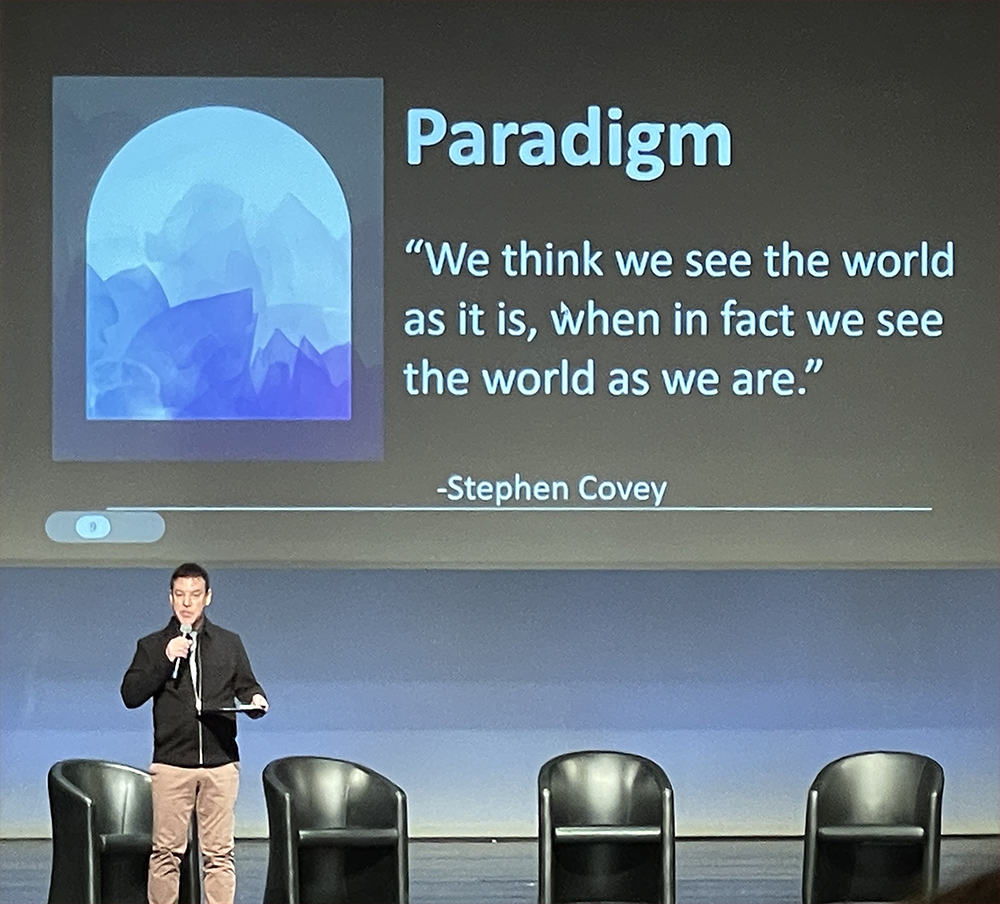Students Captivated by Unique Panel Urging Them to Reconsider Perspectives
Watching an educator quiet down an audience of nearly 500 teenagers is impressive, but watching an educator enchant the same group into understanding the power of perspectives is magical.
 And that is how the new “Shifting Paradigm” Series co-hosted by the Institute of ACS Athens, and the Academy of ACS Athens began when Academy Principal Dave Nelson took the stage at the Theater of ACS Athens.
And that is how the new “Shifting Paradigm” Series co-hosted by the Institute of ACS Athens, and the Academy of ACS Athens began when Academy Principal Dave Nelson took the stage at the Theater of ACS Athens.
“Our experiences are our lenses through which we view the world,” he shared before sharing a few images that depicted two different objects within the same image depending on the perspective of the viewer. “The image did not change. The way you saw it did. Once you change your perspective or paradigm, you can’t unsee it.”
“We decided to start the series of Shifting Paradigms with the theme about embracing failure for the very reason that often failures hold more insights for learning than our successes,” explained Carla Tanas, Dean of the Institute of ACS Athens. “With new learnings come new perspectives to the way you look at life or even live life. It is at this intersection that a paradigm shift happens as an important change when the usual way of thinking about or doing something is replaced by a new and different way.”

The panel focused on embracing failure included a diverse group of panelists, including:
- Sergio Vakirtzis, Captain at Aegean Airlines (ACS Athens alumnus, Class of 2004)
- Maria Tzevelekou, President of the Board of Directors of Lighthouse for the Blind (Greece)
- Effie Elgabry, Synesthete, and Professional Translator
As a commercial pilot, Sergio Vakirtzis first addressed the reality of fear and nervousness given the high stakes of his role in safely transporting passengers by airplane.
“Fear, nervousness, and unease are completely normal. In fact, they are part of our parasympathetic nervous system that helped humans evolve because we were able to identify threats, avoid them and become resilient.”
He described the rigorous and continuous training required of pilots every six months, which takes place using a simulator that mimics all imaginable situations so that pilots can learn how to navigate challenges, fail in a safe environment and then build muscle memory about to address challenges with skills that they’ve recently practiced. By simulating failure, they are able to learn how to avoid it in real life.
Maria Tzevelekou shared her poignant story to help students consider that what we perceive as failure may not always be what we think.
Ms. Tzevelekou described how she blamed herself when she lost her sight due to an auto-immune disease. After a few years of focusing on the challenges of blindness, she came to the realization that although she could no longer see much of what she cherished in life remained. She could still cook, dance, sing, love, and share time with friends.
“Light and darkness are inside us,” she explained. “Our mind creates how we face a situation. I try to find the good things – the positive aspects.”
More so than anything, losing her vision challenged her to embrace herself and become her own best friend.
“Once I embraced the little child inside of me, we kept each other company, and since then we’ve done great things,” she noted while underscoring for the student audience the vital importance of giving yourself grace and accepting yourself as you are.
From thinking about what it must be like to navigate life in the darkness, panelist Effie Elgabry described how she reads and hears in color due to a condition known as synesthesia that blends the senses. Ms. Elgabry lived most of her life not realizing how unique it was to read in colors and only discovered her condition when playing a board game with her daughter that required her to match letters with a color.
Years later, Ms. Elgabry is still discovering the impact of her condition because it is not easy to question yourself since you only know life from your perspective unless you pause to ask if things are different for others.
And it was with that reminder of sympathy and perspective that the first “Shifting Paradigms” discussion concluded and inspired students to reconsider how they see things, including failure, and how to use shifting perspectives, or paradigms, to their advantage.
